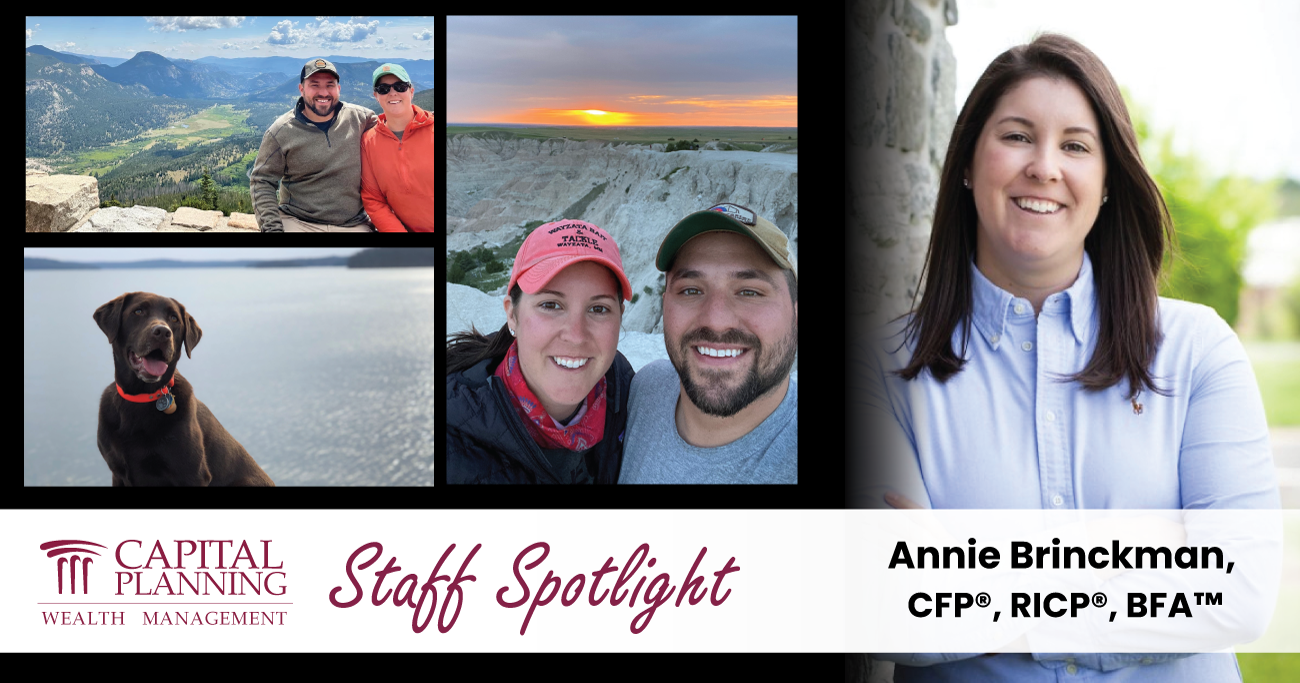
Tanya Sheffer, our Client Relationship Manager, recently sat down with us to share a little bit more about herself. In our our latest “Staff Spotlight” we found out that Tanya isn't afraid of the outdoors, is super proud of her girls, and is the office go-to resource for healthy living. Learn more here: What’s something you’re proud of? My biggest accomplishment in life is raising my two daughters, Jordyn (27) and Phoebe (21). Being a single parent since my youngest was one, sure had its challenges. Through the highs and lows, and by the grace of God, I have been able to successfully launch them into adulthood. If you could have a career in anything, what would it be? While I have been in the Financial Services Industry for 20+ years and love serving our clients, I believe everyone in the office would agree on my passion for holistic health and wellness. If I had a “do over,” I would greatly enjoy helping others with their holistic journey. Don’t get me wrong, I have a weakness for a good burger and fries, so it’s not always 100% on track! What’s your idea of a perfect day? Sunny and 70*, of…

“Sell in May and go away” is probably the most widely cited stock market cliché in history. Every year a barrage of Wall Street commentaries and stories in the financial press floods in about this popular, but overused, stock market adage. Here we take our annual look at this historical seasonal pattern which, as you will see below, has started to lose some of its street cred recently.What is sell in May?“Sell in May and go away” is the seasonal stock market pattern in which stocks generally produce the best returns from November through April and the worst returns from May through October. This pattern has been strong enough—and the adage popular enough—that it has probably been somewhat of a self-fulfilling prophecy over many years. Some investors do think it’s best to either avoid or reduce equities during this period. We’re not so sure.The two figures below illustrate this pattern. Figure 1 shows average returns by calendar month (data back to 1950). Here you can see stocks tend not to do as well during middle months, on average, particularly May through September. Figure 2 illustrates rolling six-month returns for each of the 12 rolling six-month periods by month (again, data back to 1950). Here…

Investors use various analogies to describe the importance of small businesses in the domestic economy. Some refer to the small business sector as the backbone or the lifeblood of the economy. At this current stage of the cycle, we could say there are rising risks of an acute backache or a draining of that lifeblood. In this edition of the Weekly Market Commentary, we discuss the weakness in small businesses and what that foreshadows in the markets and the economy. OverviewAs we progress through 2023, investors have at least two corresponding questions: when will a recession start and will the markets retest their lows? If we are to develop a cogent answer, we must remember the relationship between equity markets and recessions is not always consistent.In some periods, quarterly equity returns hit near-term lows during recessions, but not for the early 1990s, as shown in Figure 1. In fact, the S&P 500 fell over 14% quarter over quarter in the third quarter of 1990 as the business cycle reached a peak. And in the following two quarters during the recession, the S&P 500 rose roughly 8% and 14%—more than enough to recover losses incurred earlier in 1990. Short and ShallowOur base case is the U.S.…

Recently, we took a moment in our latest "Staff Spotlight" to learn a few things most people may not know about our Operations Associate Matthew Benedict, FPQPTM, RICP®.We found out that Matthew has some fantastic memories about where he grew up and knows his way around a chimney, but just don't ask him to draw you. More here:Who inspires you?My father and grandfather. I grew up on the mission field in Japan, with both sets of grandparents having moved there as missionaries in 1952. They as well as my father have given the whole of their lives to reaching the Japanese people in a country that has been called the “missionary’s graveyard” because of the challenge it brings in building friendships. Their patience and faithfulness in daily life there inspires me more each time I think about it.What’s one thing you’re really bad at?Drawing people. Give me anything geometrical and I can handle it, but people and faces---despite the symmetry that is there, it seems anything but symmetrical when I have a pencil in my hand. That said, I’ve been trying to do easy drawings to help illustrate Bible memory verses for our 2 year-old daughter, and, well, she gets…

We had a great timing sitting down and leaerning a few interesting things about our Director of Operations, Lee Berger, CFP®.What did we learn? Though he came up just "short" of making it to the NBA, Lee certainly has a "need for speed". Read on for more!If you could have a career in anything, what would it be?A Formula 1 driver or MotoGP rider. I love going fast, racing against good competition, and really enjoy several forms of motorsport – especially F1 and MotoGP (Motorcycle road racing).When you were a kid, what did you want to be when you grew up?For a while, I was really hoping to make it to the NBA. Due to a combination of not practicing and not growing enough, it didn’t quite end up happening. I did end up making it to the Hall of Fame last year though! (I made it there as a visitor with my wife, but at least I still got out on the court!)Do you like roller coasters?I do enjoy rollercoasters! So much so, that on one occasion I managed to ride Steel Force a total of 25 times in "one day" with one of my friends back in High…

We recently sat down and took a minute to learn a bit more about our Office Coordinator Jennifer Wegfahrt, FPQPTM . What did we learn? Well, we found out who's "spoiled" in her home, her talent for charcuterie boards, and where she likes to visit. Read on for more! Do you have any pets? "This is Bindi (see above), my mischievous and spoiled child (I mean cat)." What's one thing you're really good at? "It’s difficult for me to “toot my own horn” but I’ve gotten a lot of positive feedback and requests for my charcuterie board creations." What's the best place you've traveled to? "I am not an avid traveler, but South Carolina sure has a piece of my heart. Almost quite literally as my in-laws moved there a few years ago. My husband and I always enjoy visiting family, exploring new places, and eating great food."You can read Jennifer's full bio here >

The Federal Reserve (Fed) has a history of raising short-term interest rates until something “breaks.” Considering the Fed has raised rates from a near-zero level to 4.75% (upper bound) over the course of only one year, it was almost a near certainty this time would be no different. Recent bank failures suggest things are indeed starting to break. However, we don’t think we’re on the brink of a full-blown crisis, as market indicators we follow suggest contagion risks are still currently low. And while we don’t think a full-blown crisis is imminent, financial stability risks have clearly increased, which makes a prudent asset allocation plan a must. ContagionThe aftermath of the Silicon Valley Bank (SVB) and other bank failures in the U.S. rippled into Europe last week as Credit Suisse’s (CS) troubles moved firmly into the spotlight. The Swiss bank’s shares slid to an all-time low on Wednesday after the Saudi National Bank (which owns almost 10% of CS) stated it would not provide additional financial support after CS earlier acknowledged “material weakness” in its financial reporting. This followed a series of missteps and compliance issues that have hindered the bank’s global standing in recent years.Then, on Thursday, the Swiss…

We wanted to take a moment to provide you with some resources and perspective on the big news that arrived Friday in the financial world.Last week, SVB Financial (SIVB) made headlines due to its significant share price collapse. The bank, also known as Silicon Valley Bank, attempted to raise capital to compensate for losses in its Treasuries-heavy investment portfolio, but reports suggest that these efforts were unsuccessful, and the bank will have to sell itself.Meanwhile, late Sunday, regulators closed Signature Bank, an FDIC-insured New York state commercial bank. The institution fell victim to excess crypto-related deposits and was also experiencing material deposit outflows.However, it’s important to know that the collapse of SIVB & SBNY is unlikely to be systemic, as the bank's unique focus on emerging tech companies & Cryptocurrency and its high % of customer Deposits over FDIC, differentiates it from traditional banks. Further, the Fed has stepped in and said that they would make whole all depositors of these two banks and unveiled a new program to ensure banks can meet the needs of all their depositors, called the Bank Term Funding Program.At this time, we do not believe the SVB and SBNY bank failures are a deeper…

While concerns about the debt ceiling have been increasing, markets, businesses, and the economy are likely to see only minimal impact until we are days, or maybe a few weeks, from the “x date,” the date on which the federal government will no longer be able to meet all its obligations, likely in the summer or early fall. We continue to believe the chances that Congress will fail to raise the debt ceiling before the x date remain extremely low, but current political dynamics have likely increased the risk and there are some negative consequences to even an eleventh hour agreement, as we saw in 2011.Debt ceiling drama is once again increasing, but the build-up will be slow. The Department of the Treasury (Treasury) has been using “extraordinary measures” to cover debt payments since January 19, but that has not been an unusual course of action and does not impact the government’s ability to function smoothly. Markets, businesses, and the economy are likely to see only minimal impact from the debt ceiling debate until we are days, or maybe a few weeks, from the “x date,” the date on which the federal government will no longer be able to meet…

We recently took a few moments to learn a bit more about Wealth Advisor Annie Brinckman, CFP®, RICP®, BFA™ and found out what changed her career goals all the way back in third grade, her "hidden talent", and what she would NEED to have on a deserted island. Read on for more!When you were a kid, what did you want to be when you grew up?"As a kid I dreamed of being an architect. That dream left me around 3rd grade when I realized it was too difficult to spell! In college, I fell in love with financial planning and find a lot of similarities in planning/designing a retirement income plan as I do designing a home. Both are wonderful opportunities for blending creativity and engineering."Do you have any hidden talents or hobbies? "As a woman of many “odd hobbies,” this is a difficult one. I have solved a rubiks cube in under a minute – I’d say that’s a hidden talent of mine. In high school, it was the only toy the teacher’s would let me fiddle with in class without taking it away! Although my hand’s don’t move quite as fast as they once have, I can consistently solve…

Planning for an unpredictable future can feel overwhelming, with so many decisions to make it can be hard to know if you're going to have enough money to support yourself through retirement.
In this guide, experts from the Capital Planning Team have simplified the 10 steps you can take, so that you can live a life without worry, sfe in the knowledge that your financial future is secure.